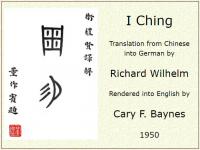You are only seeing posts authors requested be public.
Register and Login to participate in discussions with colleagues.
The I Ching or Book Of Changes
Public
 The I Ching, or Book Of Changes, is an ancient Chinese book. While there are many translations, the German translation by Richard Wilhelm rendered into English by Cary F. Baynes (1950) has become a well respected classic. The book includes a foreword by CG Jung, psychiatrist and psychoanalyst, who has elsewhere described using the I Ching in his psychiatric practice from time to time. An electronic version of the text related to the hexagrams (the oracle), from the first part of the translation, can be viewed online or downloaded using the link below.
The I Ching, or Book Of Changes, is an ancient Chinese book. While there are many translations, the German translation by Richard Wilhelm rendered into English by Cary F. Baynes (1950) has become a well respected classic. The book includes a foreword by CG Jung, psychiatrist and psychoanalyst, who has elsewhere described using the I Ching in his psychiatric practice from time to time. An electronic version of the text related to the hexagrams (the oracle), from the first part of the translation, can be viewed online or downloaded using the link below.
The Wilhelm/Baynes translation of the I Ching is available as a printed book by the Bollingen Foundation published by Princeton University Press that also includes additional materials discussing the history, the Trigrams, the underlying principles, and Commentaries.
In the foreword CG Jung pays tribute to the memory of his late friend, Richard Wilhelm, and he offers some thoughts:
... Our science is based upon the principles of causality ... but a great change is setting in. ... The axioms of causality are being shaken to their foundations ... what we term natural laws are merely statistical truths and thus must necessarily allow for exceptions.
... We have not sufficiently taken into account ... the invariable validity of natural law. If we leave things to nature, we see a very different picture: every process is partially or totally interfered with by chance, so much so that under natural circumstances a course of events absolutely conforming to specific laws is almost an exception.
... the Chinese picture of the moment encompasses everything down to the minutest nonsensical detail, ... Thus it happens that when one throws the coins, or counts through the yarrow stalks, these chance details enter into the picture of the moment of observation and form a part of it ... the hexagram is the exponent of the moment in which it is cast ... an indicator of the essential situation prevailing in the moment of its origin.
... Why not venture a dialogue with an ancient book that purports to be animated?
An electronic version of the text of the hexagrams can be found online at I Ching Wilhelm Baynes Translation where it can be viewed as an html webpage or pdf file and the pdf file can be downloaded for offline use on a mobile phone, eBook reader or a computer. It includes the appendix on how to consult the oracle using the yarrow stalk or three coin methods. It also includes a fascinating brief discussion on the mathematical analysis of the difference in probabilities using the yarrow stalks or three coins and describes an alternate method using two coins that emulates the probabilities when using the yarrow stalks.
In addition, the website makes reference to the original German translation by Richard Wilhelm including citations of Goethe that were removed when rendered to English by Baynes. It also includes a link to the documentary film on the life and work of Richard Wilhelm by his granddaughter Bettina Wilhelm. The documentary, "Wisdom of Changes - Richard Wilhelm and the I Ching" is available on YouTube and provides a glimpse into the history of China.
Why not take a look at the translation and use the yarrow stalk or coin methods to "venture a dialogue with an ancient book?"
Web Links
There are many links on the Internet related to the I Ching, a few that may be of interest are:
I Ching Wilhelm Baynes Translation
An electronic version of the text of the hexagrams that can be viewed as an html webpage or pdf file and the pdf file can be downloaded for offline use.
Documentary film by Bettina Wilhelm, Wisdom of Changes - Richard Wilhelm and the I Ching
https://www.amazon.com/Ching-Book-Changes-Bollingen-General/dp/069109750X/
"Princeton's Bollingen edition--still regarded as the best and most authentic by I Ching aficionados." ― The New York Times Book Review
Associate Professor Karyn Lai: The Yijing (Book of Changes) and Chinese Philosophy, https://www.youtube.com/watch?v=Ebp2U2O9194
Professor Karyn Lai talks about the history of the I Ching, Taoism (a celebration of contrast), Confucianism and how they relate to Chinese medicine and the view of the world.
Alan Watts - The I Ching, https://www.youtube.com/watch?v=cwSYbZoa4mk
Wikipedia, https://en.wikipedia.org/wiki/I_Ching




